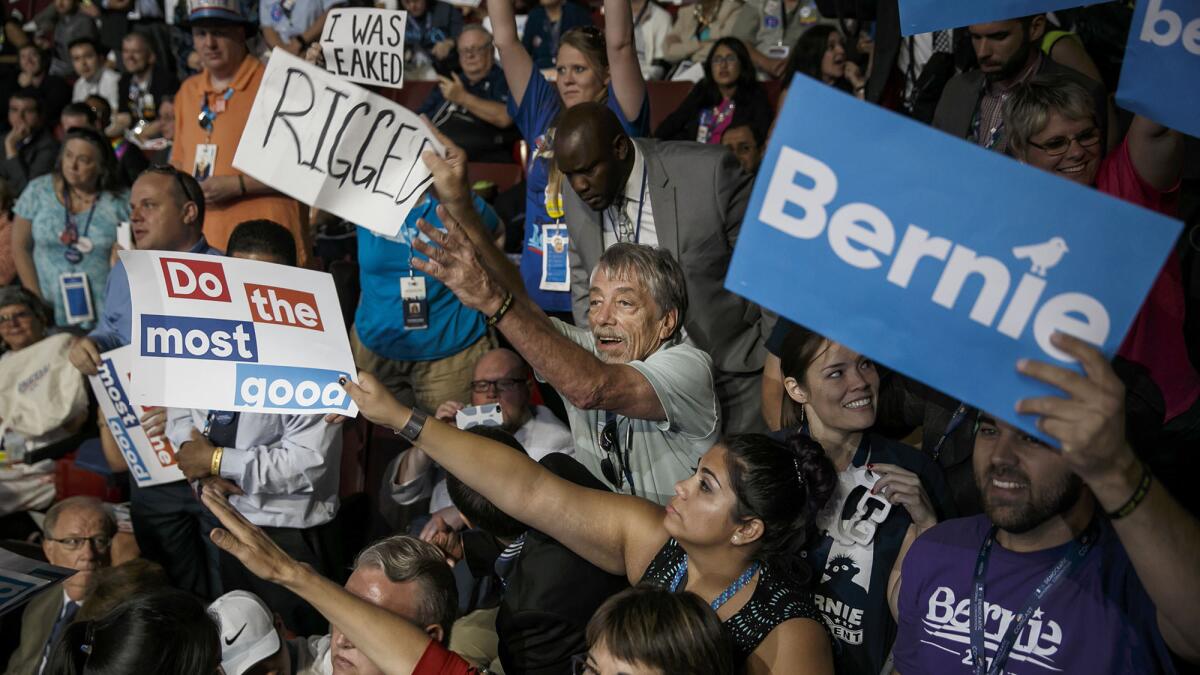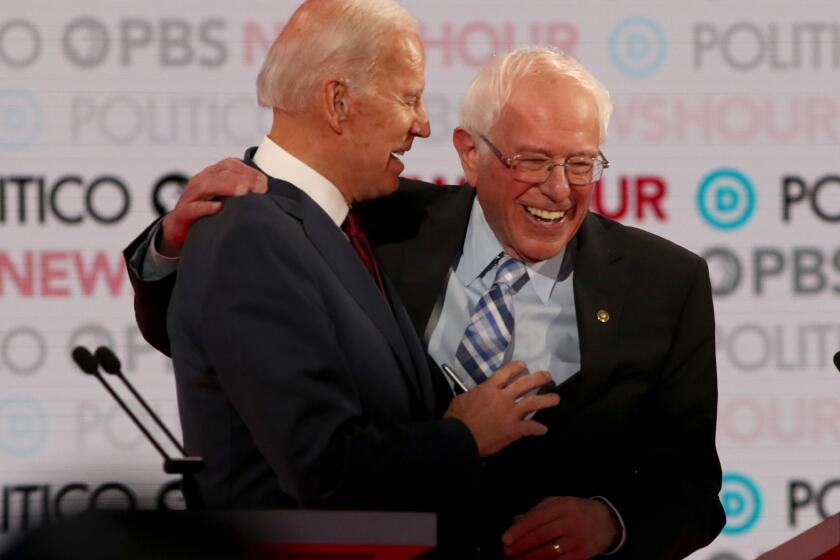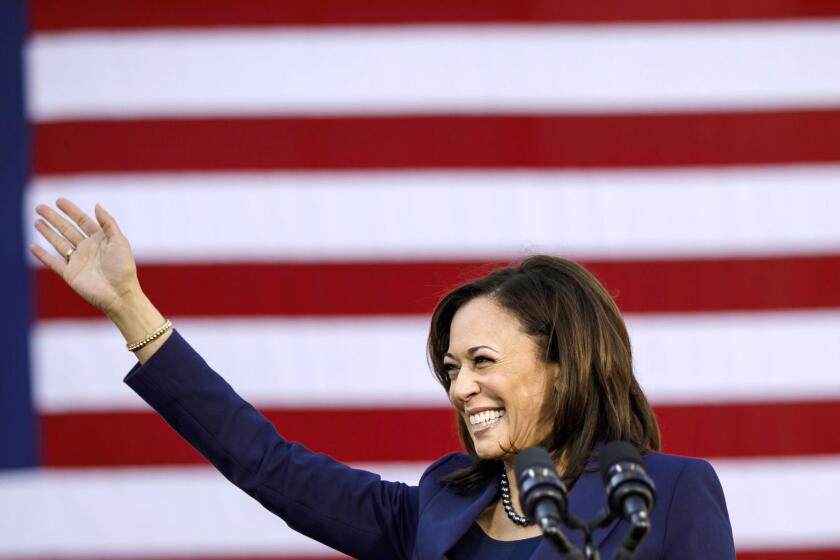Sanders supporters felt burned at the 2016 DNC. This year, Democratic leaders push for unity

In 2016, Bernie Sanders supporters were fed up.
The Vermont senator’s loyal following from his progressive, insurgent campaign continued long after his bid for the Democratic Party nomination ended. His supporters marched in 97-degree Philadelphia heat outside the Democratic National Convention, their frustration fueled by leaked emails showing party favoritism for his primary opponent, Hillary Clinton.
The tension between Sanders and Clinton and their supporters lasted through the nomination process and left a bitter aftertaste as Clinton’s campaign sought to unify the party against Donald Trump.
Now, as Sanders comes in second once again, this time to Joe Biden, the animosity and recriminations of 2016 have been largely avoided. The two men have had a far more cordial relationship, even during a heated primary battle, than Sanders and Clinton did.
“It wasn’t about avoiding animosity, because it wasn’t there,” said Symone D. Sanders, a senior advisor to the Biden campaign, who noted the rapport between the men. “Going into the convention, our party is more united than ever.”
The Democratic Party platform largely reflects the points of the Biden-Sanders Unity Task Force, which is made up of supporters the men gathered to foster harmony and make policy recommendations. The party and the Biden campaign are reaching out to young voters, who lean progressive and formed a core part of Sanders’ base, recognizing them as an important factor in defeating President Trump.
Presumptive Democratic nominee Joe Biden will let Bernie Sanders keep hundreds of delegates he would otherwise forfeit by exiting presidential race.
Since Sanders’ 2016 bid brought progressive policies such as canceling student debt and universal healthcare to the Democratic presidential race, he has helped move the party further left and energize the youth vote. Young people have become increasingly politically active and engaged since 2016, according to polling from the Center for Information & Research on Civic Learning and Engagement. More than 80% of those surveyed by the center this year say they believe they have the power to change the country.
“Young people don’t want to be asked to just show up in November,” said Sarah Audelo, executive director of the Alliance for Youth Action, a progressive young voters’ group. “They want to be part of this process.”
In March, the centrist Biden proposed free tuition for some students, and he recently earned praise from the youth-led organization Sunrise Movement for his expanded climate change policy. The group, which endorsed Sanders in the primary, had months earlier given Biden a failing score when comparing his climate change plan to the Green New Deal. When it became clear he was the presumptive nominee, Biden made direct appeals to Sanders’ younger base, whose politics have been shaped by the crises facing their generations.
But there are some concessions many in the Sanders camp are not willing to make, even with the coronavirus pandemic forcing the convention to go completely virtual. Sanders delegates are continuing their own protesting efforts: More than 700 delegates, the majority of whom are Sanders representatives, have pledged to vote against the party platform because it doesn’t include one key issue: Medicare for all.
Voting no is a symbolic gesture, a push for the core values of the left, said Zenaida Huerta, a Sanders delegate from California.
“It’s about saying that any kind of Democratic Party platform is woefully insufficient if it does not include something that is glaringly needed given our current pandemic,” said the Whittier resident, 21, who attended her first convention four years ago.
“We were seen as pie-in-the-sky people” in 2016, Huerta said. Now the party has moved closer to progressive ideals, with Democrats broadly supporting a government healthcare plan. “In some ways, even though we have less Sanders delegates this time around ... we have more leverage than we did in 2016,” she said.
She signed a letter protesting the convention speaking slot for John Kasich, a former Republican governor of Ohio. And she recently began circulating another, from the Young Delegates Coalition, advocating for younger speakers. The coalition, consisting of 225 delegates younger than 36, estimated that the average age of this year’s speakers is 62. Only two are under 40.
Sanders delegate Christopher McClain, 27, said he is disheartened at his party’s efforts to reach out to moderate voters because it feels like the “same old, same old.”
“I completely understand the point to reach across the aisle,” the California delegate said. “The point of contention is that we’re losing policies and morality to do so, and we’re not standing strong on what our Democratic values are.”
McClain, who is attending his first convention, said his group has been pleading with the party to amplify progressive voices as a way to energize young voters. “It’s hard to get people excited to vote Trump out when our party is catering to the party who we’re trying to defeat.”
Some progressive leaders remain skeptical that Biden’s choice of California Sen. Kamala Harris as a running mate will help bring the party’s left wing into the fold.
Joe Biden has chosen California Sen. Kamala Harris as his running mate. She could be the first woman and first person of color to be vice president.
Norman Solomon, national director of the progressive group RootsAction, said Biden’s choice of a fellow moderate could hurt turnout among progressives. It sends a message that “this big tent isn’t big enough for you,” he said.
“We’re committed to defeating Trump, but I’m worried that the Biden bubble at the top of the campaign is just checked out of the turnout issues,” he said.
There are some delegates who feel there is more common ground this time around when it comes to generational affinity.
Joseph Mullen, 18, co-founded the Young Delegates Coalition, which includes supporters of Sanders, Biden, Massachusetts Sen. Elizabeth Warren and former South Bend, Ind., Mayor Pete Buttigieg.
Mullen, a Florida resident and Sanders delegate, said he does not agree with Biden’s centrist views but believes it’s important that his generation come together on their shared concerns, such as the climate crisis and criminal justice reform.
“One way or another,” he said, “Biden is going to be that bridge to the next generation of the Democratic Party.”
Symone D. Sanders acknowledged that although progressives have different ideas of how to address major issues, such as climate change, college affordability and access to healthcare, the Biden campaign has the same goals.
“It’s not about asking some groups or individuals to drop what they believe,” she said. “But it’s also not about pulling Vice President Biden to a place where he is not. It’s about, where do we align.”
More to Read
Get the L.A. Times Politics newsletter
Deeply reported insights into legislation, politics and policy from Sacramento, Washington and beyond. In your inbox three times per week.
You may occasionally receive promotional content from the Los Angeles Times.












